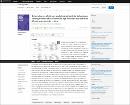Determinants of dietary and physical activity behaviours among women of reproductive age in urban sub-Saharan Africa: a systematic review

View/
Date
2020-05-28Author
Yiga, Peter
Seghers, Jan
Ogwok, Patrick
Matthys, Christophe
Metadata
Show full item recordAbstract
Urban sub-Saharan Africa is in a nutrition transition shifting towards consumption of energy-dense nutrient-poor diets and decreasing physical activity. Determinants of nutrition transition in sub-Saharan Africa are presently not well understood. The objective of this review was to synthesise available data on determinants of dietary and physical activity behaviours among women of reproductive age in urban sub-Saharan Africa according to the socio-ecological framework. We searched MEDLINE, Embase, Scopus, Web of Science and bibliographies of included articles for qualitative, observational and randomised controlled studies published in English from January 2000 to September 2018. Studies conducted within general populations of women aged 18–49 years were included. Searches were according to a predefined protocol published on PROSPERO (ID = CRD42018108532). Two reviewers independently screened identified studies. From a total of 9853 unique references, twenty-three studies were retained and were mainly from South and West Africa. No rigorous designed quantitative study was identified. Hence, data synthesis was narrative. Notable determinants of dietary behaviour included: convenience, finances, social network, food skills and knowledge gaps, food deserts and culture. Cultural beliefs include strong relationship between high social status and weight gain, energy-dense confectionery, salt or fat-rich foods. Physical activity is influenced by the fast-changing transport environment and cultural beliefs which instigate unfavourable gender stereotypes. Studies with rigorous qualitative and quantitative designs are required to validate and develop the proposed frameworks further, especially within East Africa. Nevertheless, available insights suggest a need for comprehensive skill-based interventions focusing on socio-cultural misconceptions and financial limitations.
URI
https://doi.org/10.1017/S0007114520001828.https://kyuspace.kyu.ac.ug/xmlui/handle/20.500.12504/440
